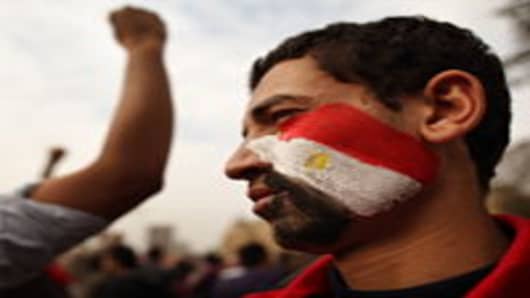Maria Bartiromo spoke with Rachid Mohamed Rachid, Former Minister of Trade and Industry of Egypt about the crisis in Egypt.
Rachid called it “paralysis in the country” for the short-term.
Rachid expects the crisis to have “impact on growth numbers, production. And the faster we can go back to normality, the faster we can recover from that situation,” said Rachid. For the long-term, Rachid believes “this is going to be quite challenging.”
Mr. Rachid, along with the previous government resigned on Saturday. Rachid said the newly appointed Prime Minister Ahmed Shafiq offered him to stay in the cabinet and take the same position, but Rachid declined.
Here’s a transcript of Maria Bartiromo’s interview.
BARTIROMO:Let me begin as far as your hope for this transitional government, and what you can tell us as far as what's happening on the ground today in Egypt.
RACHID:The situation is still very, very tense. Unfortunately, we still have a disagreement between the different opposition parties on how to move forward. The President, four days ago, he announced a series of actions towards the transition, to arrange for an election to start in July. The situation on the ground is still very confusing, because all the young people have really gone to the street and made that huge change in the last ten days, they do not have a clear leadership yet.
Many of the old opposition party are jumping the bandwagon and trying to claim that they own the voice of the young people. It's not there yet. But in the meantime we are seeing every single day, real change happening. We have now a complete change in the ruling party.
We have now, the President has issued a decree to form a committee for constitutional changes. We have already almost dissolved the Parliament. We will have new election. So many things happening, too fast worrying of the speed, but at the same time we still having a lot of pressure from the different factions at the moment. Yes.
BARTIROMO:Can you take us back over the last ten days, how did this start? What was the catalyst?
RACHID:On the 24th of January I don't think a single sole on this planet was expecting what happened on the 25th, including the young people who went to the street. Nobody expected the march on the demonstration that the young people, through the Internet, and through the Facebook, have organized.
This is actually an explosion that happened inside of Egypt. Because for many, many years now, despite the fact that there was intention to do political reform, all the young people of Egypt have never been given the chance to have proper channels to express themselves. The formation of new parties were banned. The ability of young people to practice politics, in many places was not allowed. So on one hand we allowed freedom of speech, we have allowed all the access to all the internet, and the rest of the world. But we have not given formal channels for all these young people to express themselves.
And that's exactly the explosion that happened on the 25th. And from then on, Egypt has changed. What we have today is a completely new Egypt. Egypt that is hopefully on the positive side, that will be lead by young people, and the vision of the youth. And will not look back. But on the negative side, Egypt that's still facing a lot of uncertainty between now and stability in the next few months.
BARTIROMO:What do you think the economic impact of these events will have on the country in the short-term, and the longer-term?
RACHID:Well unfortunately, short-term, the impact will be negative. We have seen almost ten days of paralysis in the country. This is going to have an impact on growth numbers, it will have an impact on production. I'm sure it will have an impact on prices, also, on scarcity of goods.
The faster we can go back to normality, the faster we can recover from that situation. We already have seen signs. Today I hear that most of the production units are back to 60, 70 percent of their capacity. But still, we still have to cross that very high level of uncertainty.
Long-term, this is going to be quite challenging. Egypt has been delivering very high growth, attraction for investment, in the last five, six years. Today we still have to get to a completely different situation. There are some steps that need to be taken. One, rule and order has to come back to the street. Stability has to be established. The confidence of the business community that is a government that is business-friendly, which is in doubt at the moment.
The fact that the transition will be smooth, and the vision of what Egypt will become. All these conditions are now going to very much, create the future of the economy in Egypt in the next six to seven months. But I can tell you one thing, from my experience, Egypt is a great country. Has a huge potential.
What happened the last few days has proven that our young people can also be a huge asset.
BARTIROMO:You were part of the previous cabinet for more than six years during a real diversification of the economy, where millions of new jobs were created in the private sector. The country, of course, Egypt, the most populous in the region. Do you believe that the government can articulate clearly what needs to be done? I'm looking at expectations that the government needs growth of at least seven percent to actually create jobs.



